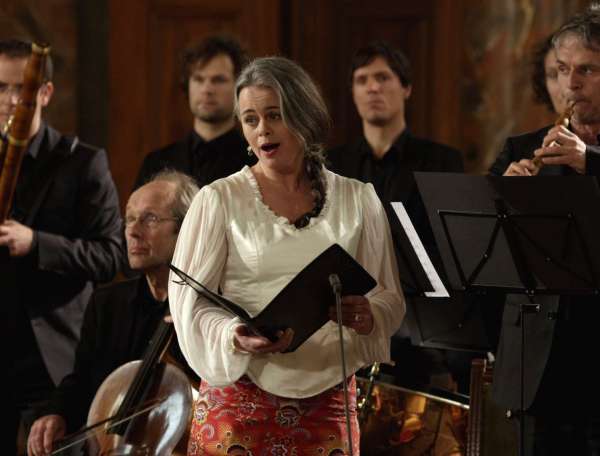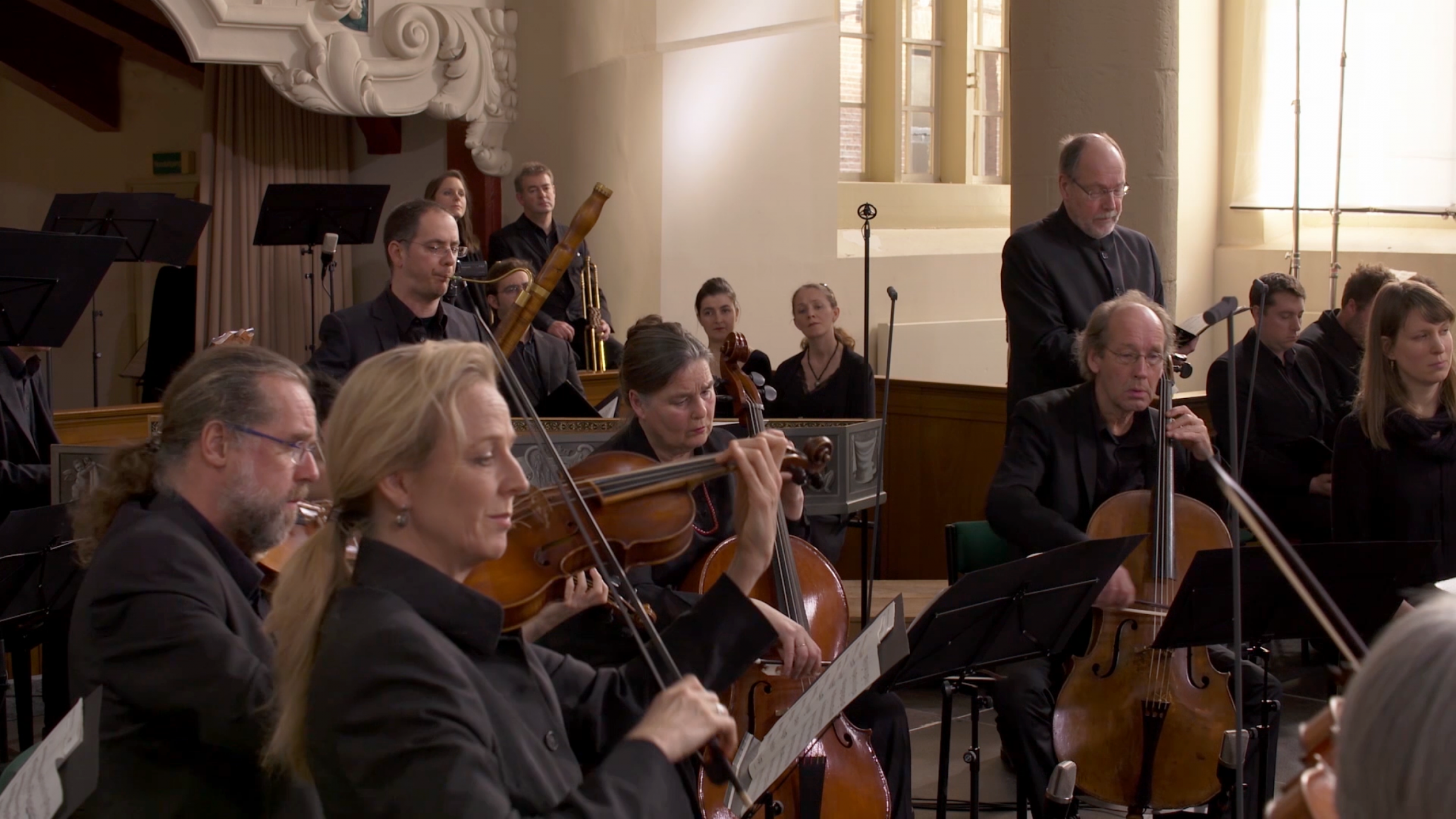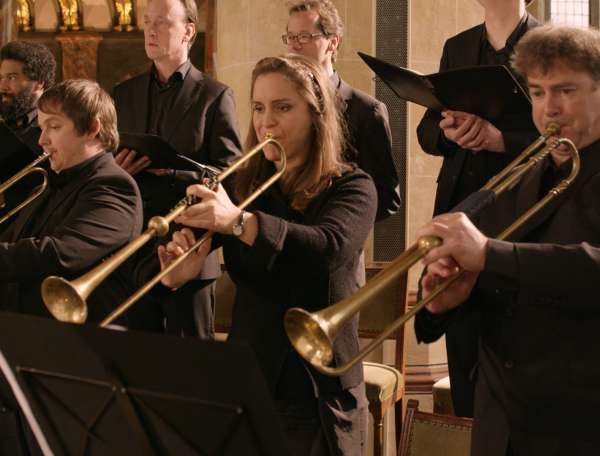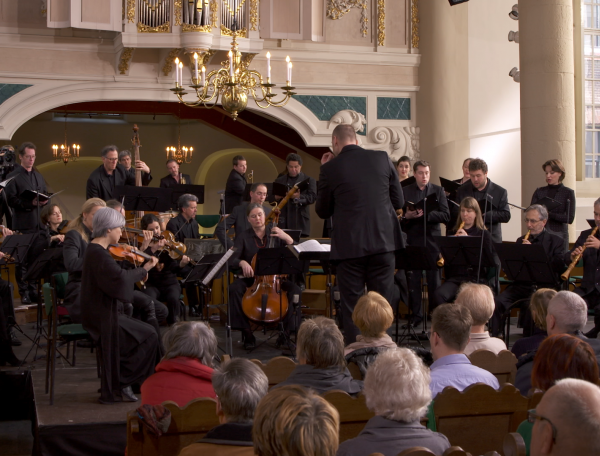

Lobe den Herrn, meine Seele
BWV 69 performed by the Netherlands Bach Society
conducted by Peter Dijkstra
Walloon Church, Amsterdam
Behind the music
Theatrical and triumphant
The jubilant character of this cantata meant it could be easily transformed
Bach performed the first version of this cantata when he had been working for just half a year in Leipzig, on the twelfth Sunday after Trinity. Many of the devout town councillors would have been concerned during the opening section. Talk about theatrical! The triumphant words of Psalm 103 are accompanied by a rich orchestral setting that includes three trumpets, timpani, three oboes and a bassoon, besides the strings. The mood is ecstatic, with elaborate circulatios in nearly all the parts. A circulatio is a series of fast notes that ‘circulate’ around a central pitch. Baroque composers used this musical-rhetorical figure to express a state of joy and bliss. Later on, there is an expressive Seufzer (‘sigh’) on the word ‘vergiss’: the congregation is urged to remember all the good that God has done for them.
The gospel reading for this Sunday was St Mark 7:31-37, which tells how Jesus healed a deaf man. The first aria praises this miracle. In the second aria, for bass, an oboe d’amore (‘oboe of love’) makes its appearance. Here, the believer asks for God’s blessing in times of suffering and death. The closing line cites the gospel text, with words that also link up to the psalm text of the opening chorus: ‘Gott hat alles wohlgemacht’.
This first version of the cantata was given the number 69a in the list of Bach’s works. Sometime in the latter years of his life, Bach was to transform the composition into a ‘Ratswahlkantate’ (a town council inauguration cantata). This version, BWV 69, is the one we are performing here. The change of town council was traditionally accompanied by a festive service for which Bach had to write the music. Lobe den Herrn, meine Seele was easy to transform, thanks to its jubilant character. Bach left the opening chorus and the two arias as they were. Originally, in 1723, the first aria was for tenor, but at a second performance of BWV 69a, in 1727, Bach had already rewritten it for alto.
However, Bach did change the recitatives and the final chorale. He completely recomposed the recitatives, based on a newly written text. Bach made a thorough job of it. For instance, in the second recitative the tenor expresses the hope that God will bestow ‘the spirit of wisdom’ on the new town council of Leipzig. At that moment, the strings join in, lending more solemnity to the message.
- BWV
- 69
- Title
- Lobe den Herrn, meine Seele
- Instrument
- alto, bass, soprano, tenor
- Genre
- cantatas
- Year
- 1723 (BWV 69a), revived in 1727, reworked as Ratswahlkantate after 1740
- City
- Leipzig
- Lyricist
- unknown, psalm 103:2 and chorale by Martin Luther
- Occasion
- inauguration of the town council (Ratswahl)
- First performance
- unknown
- Special notes
- There is an earlier, sacred version of this cantata with the same title, BWV 69a, which Bach wrote in 1723 for the twelfth Sunday after Trinity.
Extra videos
Vocal texts
Original
1. Chor
Lobe den Herrn, meine Seele,
und vergiss nicht
was er dir Gutes getan hat.
2. Rezitativ (Sopran)
Wie groß ist Gottes Güte doch!
Er bracht uns an das Licht,
und er erhält uns noch!
Wo findet man nur eine Kreatur,
der es an Unterhalt gebricht?
Betrachte doch, mein Geist,
der Allmacht unverdeckte Spur,
die auch im Kleinen
sich recht gross erweist.
Ach! möcht es mir, o Höchster,
doch gelingen,
ein würdig Danklied dir zu bringen!
Doch, sollt es mir hierbei
an Kräften fehlen,
so will ich doch, Herr,
deinen Ruhm erzählen.
3. Arie (Alt)
Meine Seele, auf!
erzähle was dir Gott
erwiesen hat.
Rühme seine Wundertat,
lass, dem Höchsten
zu gefallen,
ihm ein frohes Danklied schallen.
4. Rezitativ (Tenor)
Der Herr hat große Ding an uns getan;
denn er versorget und erhällt,
beschützet und regiert die Welt;
er tut mehr als man sagen kann.
Jedoch, nur eines zu gedenken:
Was könnt uns Gott
wohl bessers schenken,
als dass er unsrer Obrigkeit
den Geist der Weisheit gibet,
die denn zu jeder Zeit das Böse straft,
das Gute liebet?
Ja, der bei Tag und Nacht
vor unsre Wohlfahrt wacht.
Lasst uns dafür den Höchsten preisen:
auf, ruft ihn an, dass er sich auch
noch fernerhin so gnädig woll’ erweisen.
Was unserm Lande schaden kann,
wirst du, o Höchster, von uns wenden,
und uns erwünschte Hülfe senden.
Ja, ja, du wirst in Kreuz und Nöten
uns züchtigen, jedoch nicht töten.
5. Arie (Bass)
Mein Erlöser und Erhalter,
nimm mich stets in Hut
und Wacht.
Steh bei mir in Kreuz und Leiden,
Alsdenn singt mein Mund mit Freuden:
Gott hat alles wohl gemacht.
6. Choral
Es danke, Gott, und lobe dich
das Volk in guten Taten.
Das Land bringt Frucht
und bessert sich,
ein Wort ist wohl geraten.
Uns segne Vater und der Sohn,
uns segne Gott, der Heilge Geist,
dem alle Welt die Ehre tut,
für ihm sich fürchten allermeist;
und sprecht von Herzen: Amen!
Translation
1. Chorus
Praise the Lord, my soul,
and do not forget the good
He has done for you!
2. Recitative (Soprano)
How great, indeed, is God's goodness!
He brought us to the light,
and sustains us still.
Where can one find even a single creature
that lacks for sustenance?
Only consider, my spirit,
the unconcealed trace of the Almighty,
who even in the smallest things
reveals Himself greatly.
Ah! If only I could be successful,
o Highest,
in bringing You a worthy song of gratitude!
Yet, should the skill
be lacking in me in this,
I will still tell, Lord,
of Your glory.
3. Aria (Alto)
My soul, arise!
tell what God
has revealed to you!
Speak of His wondrous deeds,
to please
the Highest,
let a happy song of thanks resound!
4. Recitative (Tenor)
The Lord has done great things for us.
Since He cares for and sustains,
protects and guides the world.
He does more than can be put in words.
However, consider only one thing:
what better gift could God give us,
than that to our government
He would give the spirit of wisdom,
which at all times
punishes evil,
and loves goodness?
Indeed, which by day and night
watches over our welfare?
Let us therefore praise the Highest;
Arise! call to Him, so that henceforth
He will reveal Himself graciously.
What might be harmful to our land,
You will turn aside from us, o Highest,
and send us wished-for aid.
Yes, yes, with suffering and troubles
You will punish us, but not kill us.
5. Aria (Bass)
My Redeemer and Sustainer,
take me always under your protection
and watch!
Stand by me in suffering and sorrow,
then my mouth will sing with joy:
God has made all things well.
6. Chorale
May You, o God, be thanked and praised
by people in good works;
the earth brings forth fruit
and improves itself,
Your word is flourishing.
May the Father and the Son bless us,
may God, the Holy Spirit, bless us,
to Whom all the world gives honour,
and Who is held in the greatest awe
and let us heartily say: Amen!
translation © Pamela Dellal
Credits
-
- Release date
- 16 February 2018
-
- Recording date
- 18 February 2017
-
- Location
- Waalse Kerk, Amsterdam
-
- Conductor
- Peter Dijkstra
-
- Soprano
- Miriam Feuersinger
-
- Alto
- Alex Potter
-
- Tenor
- Thomas Hobbs
-
- Bass
- Peter Kooij
-
- Ripieno soprano
- Lauren Armishaw, Marjon Strijk
-
- Ripieno alto
- Marine Fribourg, Barnabás Hegyi
-
- Ripieno tenor
- Yves Van Handenhove, João Moreira
-
- Ripieno bass
- Michiel Meijer, Pierre-Guy Le Gall White
-
- Violin 1
- Sayuri Yamagata, Annelies van der Vegt, Annabelle Ferdinand
-
- Violin 2
- Pieter Affourtit, Paulien Kostense, Lucia Giraudo
-
- Viola
- Staas Swierstra, Jan Willem Vis
-
- Cello
- Lucia Swarts, Richte van der Meer
-
- Double bass
- Robert Franenberg
-
- Oboe
- Martin Stadler, Peter Frankenberg, Sarah Aßman
-
- Bassoon
- Benny Aghassi
-
- Trumpet
- Robert Vanryne, Fruzsina Hara, Mark Geelen, Dave Hendry
-
- Timpani
- Koen Plaetinck
-
- Organ
- Leo van Doeselaar
-
- Harpsichord
- Siebe Henstra
-
- Director and editor
- Bas Wielenga
-
- Music recording
- Guido Tichelman, Bastiaan Kuijt, Pim van der Lee
-
- Music edit and mix
- Guido Tichelman
-
- Camera
- Jochem Timmerman, Thijs Struick, Merijn Vrieling, Charlotte Storm, Jildert Hof
-
- Lights
- Zen Bloot, Henry Rodgers, Patrick Galvin
-
- Assistant director
- Ferenc Soeteman
-
- Video engineer
- Vincent Nugteren, Jildert Hof
-
- Set technique
- Justin Mutsaers
-
- Data handling
- Jesper Blok
-
- Project manager nep
- Peter Ribbens
-
- Interview
- Onno van Ameijde, Marloes Biermans
-
- Producer concert
- Imke Deters
-
- Producer film
- Jessie Verbrugh
Discover
Help us to complete All of Bach
There are still many recordings to be made before the whole of Bach’s oeuvre is online. And we can’t complete the task without the financial support of our patrons. Please help us to complete the musical heritage of Bach, by supporting us with a donation!

